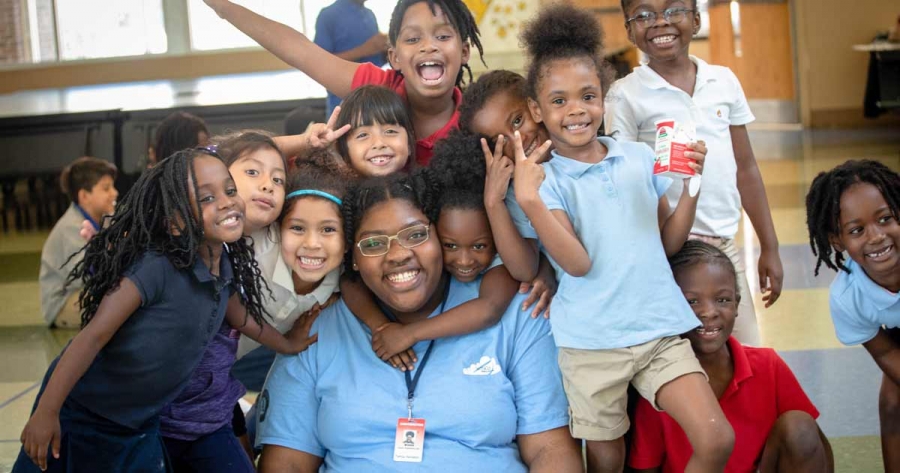Through SEL, kids learn how to develop healthy relationships, exhibit empathy, set and achieve goals, manage their emotions, and develop healthy relationships—all skills that help them succeed in school and thrive in life.
We see the positive impact of SEL on kids every day in our programs, but we also know kids aren't born with social-emotional skills. Rather, these skills are developed early on and nurtured by caring adults, including teachers and afterschool professionals. Therefore, for kids to grow and engage in SEL, it must begin with adults.
At WINGS for Kids, we believe that for adults to effectively teach social-emotional skills to kids, they must first build and strengthen their own social-emotional skills. Importantly, this process must be intentional. Training and professional development specifically focused on SEL help adults understand their own social-emotional skills. In turn, they are able to infuse SEL into every interaction with students and recognize opportunities to teach social-emotional lessons in activities, games, conversations and even homework time—effectively creating a program-wide culture of SEL.
All afterschool programs have the potential to transform the way adults approach SEL and incorporate it into daily activities, lessons and programming. Here are three ways you can start implementing SEL with your staff today.
- Practice social-emotional skill-building during staff trainings and meetings. Just as you can intentionally infuse SEL into activities with kids, you can implement it as part of your regular meetings or trainings with staff. Ask your staff to complete each of these three sentences: "Something I'm good at is ... " "An emotion I felt today was ... " "The last mistake I made was ... " This activity engages adults in practicing self-awareness—a key social emotional competency—by recognizing their emotional state, strengths and weaknesses.
- Use a kid-friendly vocabulary when talking about SEL. Creating a seamless connection between adults' social-emotional development and that of kids requires using words and terms that are easy to understand and that make SEL accessible to everyone. "Empathy," for example, may be a difficult word for kids to understand. But the idea of "stepping into someone else's shoes" is a concept they can more readily grasp. Using a kid-friendly SEL vocabulary also helps develop an inclusive culture everyone can be a part of.
- Encourage staff to model SEL for and with each other. It's been said that "children have never been very good at listening to their elders, but they never fail to imitate them." One of the best ways to teach social-emotional skills is for adults to model them in their interactions with each other, as well as with kids. Not only will students pick up on the way adults are speaking and working with each other, but staff will become more mindful of their own social-emotional development. Encourage staff to express emotions to each other, practice active listening, and recognize each other's strengths—in front of kids and during meetings or prep time. When adults understand their own social-emotional development, SEL will become part of their normal behavior.
These ideas are a great place to start if you look to immediately implement easy, yet effective SEL-focused professional development techniques for your staff. If you're interested in a more comprehensive approach to professional development rooted in SEL, investing in workshops and other training opportunities can provide the resources, supports and tools for your staff to make SEL an integral part of your afterschool program.
Bridget Laird is the chief executive officer of WINGS for Kids, a nationwide afterschool program focused solely on bringing SEL to at-risk kids. For more information about WINGS for Kids, including SEL workshops and professional development opportunities, visit WINGS for Kids.
Courtesy of WINGS for Kids.

